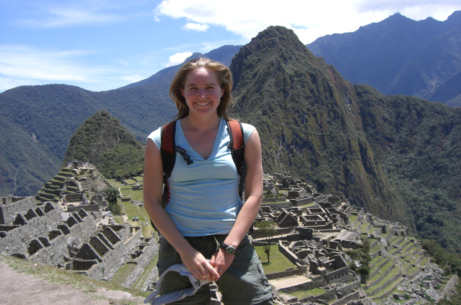
Libby Blanchard's MPhil will enhance her work on farmer development programmes.
Libby Blanchard [2012] grew up in America’s national parks. It was perhaps the perfect upbringing for someone who is interested in biodiversity conservation as well as poverty alleviation.
Libby, who has been working for a fair trade coffee importing business, will be studying for an MPhil in Environment, Society and Development at the University of Cambridge this autumn, with the help of a Gates Cambridge scholarship.
Libby, who was a champion horse rider as a teenager, has a passion for her subject and is keen to “make a difference”. That passion has helped her through the kind of problems which might have deterred other students. At College, she was diagnosed with thyroid cancer and spent much of her senior year having treatment.
She had been feeling tired and unwell for some time before her diagnosis and says it was a relief finding out what was actually wrong with her. She had surgery to remove the thyroid gland followed by radioactive iodine treatment. This involved taking a pill and sitting in a radioactive room which she says was much less painful than ongoing chemotherapy. She has recovered now, but has to take thyroid medication for the rest of her life. However, she feels this is “a small price to pay”.
Despite this, she managed not only to complete her course, but to get involved with international conservation projects and research on the side.
Her interest in conservation started early. When she was born her parents were working as park rangers at the Grand Canyon National Park in Arizona. Before she was eight she had lived in a variety of national parks in places such as Hawaii and the Rocky Mountains.
This and her parent’s stints in retirement teaching in Australia and Japan gave her a taste for travel and adventure. “It was an ideal way to grow up,” she says. “Buffalo would walk past our backyard. We lived among volcanoes in Hawaii. Mostly people visit national parks for less than a week, but I got to live in them.”
Libby was a keen horsewoman as a teenager and had dreams of competing in the Olympics. Between high school and college she moved to Switzerland to be coached by a five time Olympic medallist. She says it was “an eye-opening experience”. “I had idealised this woman. She was about to retire from the Olympics and faced a life beyond that, beyond something she had invested her whole life in. I felt there must be more to life and it made me think about the broader picture and what I wanted to achieve.”
She says she knew early on that she “wanted to make a difference to the world” and do something that was meaningful in environmental conservation or social change. At Occidental College, having stopped riding, she had a lot of time to reflect. She was interested in environmental science, but didn’t think she needed to study that as she had has such an environmentally focused upbringing. She decided to focus on developing the skills she would need to be a fundraiser, so that she could run environmental or social projects. She majored in took English Literature and Comparative Literature to develop her writing skills.
She also took advantage of opportunities offered by her university to travel abroad and won two fellowships to do so. This enabled her to reconnect with environmental and conservation issues. She went to southern Africa for eight weeks, for instance, to study the social and environmental controversies concerning boundary fences in African national parks, and the displacement of populations which sometimes results.
She also won a fellowship to study community-centred conservation at Namibia’s Cheetah Conservation Fund. “It was an amazing experience,” she says. “I met people I wanted to be like.”
Libby also studied in the Dominican Republic for seven months. “I wanted to learn Spanish and be in the developing world,” she says. Soon after, she met the president of Sustainable Harvest Coffee Importers, an organic and fair trade coffee importing company who was interested in expanding more extensively into Africa, but wanted to do so in a sustainable manner. Libby petitioned him let her try to get development grants for farmer development projects on the basis that she would only stay on if she could raise enough money to fund herself. A few months later she helped the company win a big grant for a three-year project in Tanzania. Over the last six years, she has been and is currently the company’s Director of Farmer Development Programmes.
It was on her way back from a trip to Africa last year that she visited a friend who was at Cambridge, and sat in on some classes. She decided to apply. “It was the right time to start something new and it will allow me to move on to broader development work,” she says, although it will mean being separated from her new husband who is starting his medical school residency in the US.
She says: “The MPhil programme is the next step to prepare me for a career creating effective policies that reinforce poverty alleviation and biodiversity conservation – two of the most critical global challenges of our time.”












